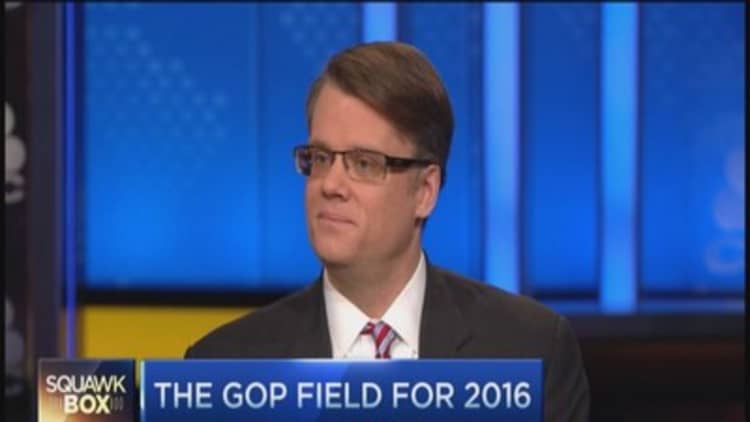
Mitt Romney made the rounds on Wall Street recently, and people who attended the meetings said they came away convinced the 2012 GOP presidential nominee would launch another campaign for the White House.
"Mitt's running," is how one senior Wall Street banker who met with Romney recently put it to me this week, saying the conventional wisdom that the 2012 nominee would make another run only if the party reached out to him in desperation next year was dead wrong. "He's running, flat out."
Others came away from meetings—some of which were intended to talk about Romney's son's investment firm—less convinced that a third White House run was a sure thing. But these people, too, said Romney's tone had changed significantly from just a month earlier. Instead of playing down the possibility of a run, these people said, Romney urged them to hold tight rather than commit to a candidate they did not love.
"He tells people not to commit to a candidate that is not their first choice and that they aren't excited about," one plugged-in Republican told me of the meetings. "He does not think much of the current field and does not think it is jelling. He still views himself as the leader of the establishment wing of the Republican Party. It's definitely a change in his message [tilted more toward running]."
The Republican added that Romney's decision doesn't depend on Jeb Bush. "He does not feel he owes the Bushes anything and does not think Jeb is the de facto leader of the establishment GOP."
Bush, for his part, is said to be nearing a decision. AtThe Wall Street Journal CEO conference this week, Bush said he was still trying to decide if getting in the race would be too tough on himself and his family. He also indicated he would not back off his stances on immigration reform and education, saying a successful approach to 2016 would be to "lose the primary to win the general."
Of course, you can't lose the primary and get to the general.
Read MoreJanet Yellen, the most important person in DC in 2015
And that is where Romney comes in. Like Bush, the former Massachusetts governor runs in the establishment, Wall Street-friendly lane of the GOP, along with New Jersey Gov. Chris Christie.
But if Romney goes, he would probably run somewhat to the right of Bush, setting up as the establishment favorite who doesn't have views on major issues that are so upsetting to the GOP base. The last time Romney ran to the right did not work out so well (remember "self-deportation?"). But if Bush is vulnerable in the primaries it is on the right.
The Romney calculus is also that Christie won't play well outside of New Jersey and could blow up in the primaries by unleashing his testy side in debates or out on the trail. Wall Street has many similar concerns about Christie. Someone will have to emerge from the establishment wing to challenge whoever comes out of the more conservative/libertarian wing that will likely feature Sens. Rand Paul of Kentucky, Ted Cruz of Texas and Florida's Marco Rubio, among others.
Read MoreWhy Obama, execs relished each other's company
There could be several other potential establishment contenders including Govs. John Kasich of Ohio and Scott Walker of Wisconsin. But neither have quite the gravitas of Bush or Romney.
Romney also undoubtedly sees all the polls showing him either leading or near the top both nationally and in early primary states for the GOP nomination. These surveys are mostly about name identification right now but they do highlight how wide open the GOP field. Indeed, it is the first time in many cycles that there is no clear "next in line" for the Republican nomination. Retired neurosurgeon and political pundit Ben Carson is now high up in polls of the GOP 2016 field, suggesting it is anyone's race for the taking.
The Romney theory of the case is that no one in the current field (besides possibly Bush) would be strong enough nationally to defeat presumed Democratic nominee Hillary Clinton. And Romney could argue that the nation would be better off economically and on foreign policy if voters had chosen him over President Barack Obama in 2012, something voters tend to agree with when asked in polls.
Read MoreWhy employers should brace for Obamacare lawsuits
None of this means Romney is a lock to get into the race. Though it's not a decisive factor, Bush's decision will certainly weigh on Romney's thinking. But at this point, Romney, who lost in the primaries in 2008 and the general in 2012, appears to be thinking the third time could be the charm.
—Ben White is Politico's chief economic correspondent and a CNBC contributor. He also authors the daily tip sheet Politico Morning Money [politico.com/morningmoney]. Follow him on Twitter @morningmoneyben.


